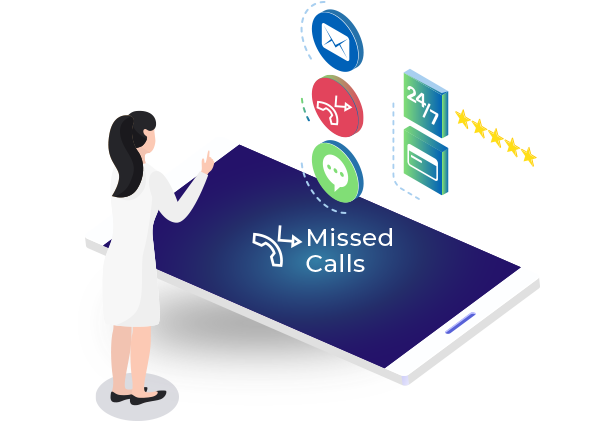
Understanding Missed Call Number Services
Missed call number services are a type of communication tool that allows businesses to handle missed calls without the need for direct conversation. When a patient calls and doesn’t reach a representative, the call is registered as a missed call. The service then sends a notification to the practice, enabling them to follow up with the patient promptly. This approach is particularly beneficial for medical practices dealing with high call volumes and limited staff availability.
Benefits of Missed Call Number Services for Medical Practices
1. Improved Patient Engagement
Missed call number services ensure that every call is accounted for, even if the patient is not directly connected to a staff member. By promptly following up on missed calls, medical practices can maintain high levels of patient engagement and demonstrate a commitment to customer service. This proactive approach helps build trust and enhances patient satisfaction.
2. Enhanced Appointment Scheduling
Scheduling appointments can be a challenging task for medical practices, especially when managing a large number of requests. Missed call number services simplify this process by capturing missed call information and allowing the practice to respond quickly. This leads to more efficient appointment scheduling and reduces the risk of missed or double-booked appointments.
3. Streamlined Administrative Tasks
Administrative tasks such as managing patient inquiries, handling appointment reminders, and processing follow-up calls can be time-consuming. Missed call number services automate these tasks, allowing staff to focus on more critical responsibilities. This automation improves overall practice efficiency and reduces administrative burdens.
How to Implement Missed Call Number Services in Your Medical Practice
1. Choose the Right Service Provider
Selecting a reliable missed call number service provider is essential for a successful implementation. Look for providers that offer features tailored to medical practices, such as integration with existing appointment systems and customizable follow-up options. Ensure that the provider has a strong track record of reliability and customer support.
2. Integrate with Existing Systems
To maximize the benefits of missed call number services, integrate them with your practice’s existing systems. This includes appointment scheduling software, electronic health records (EHR) systems, and patient communication tools. Integration ensures a seamless workflow and enables staff to access and act on missed call information efficiently.
3. Train Your Staff
Effective implementation requires proper training for your staff. Ensure that all team members understand how to use the missed call number service, follow up on missed calls, and manage patient information. Providing training resources and support will help your staff adapt to the new system and maintain high levels of service.
4. Monitor and Evaluate Performance
Regularly monitor the performance of your missed call number service to ensure it meets your practice’s needs. Evaluate key metrics such as response times, patient satisfaction, and appointment scheduling efficiency. Use this data to make adjustments and continuously improve the effectiveness of the service.
Addressing Common Concerns
1. Privacy and Security
One common concern with missed call number services is the handling of patient information. Ensure that your service provider adheres to strict privacy and security standards, such as HIPAA compliance, to protect patient data. Verify that the service includes encryption and secure storage options to safeguard sensitive information.
2. Cost Considerations
While missed call number services can offer significant benefits, it’s important to consider the associated costs. Evaluate the pricing structure of different providers and assess whether the investment aligns with your practice’s budget and needs. Consider the potential return on investment in terms of improved efficiency and patient satisfaction.
3. Integration Challenges
Integrating missed call number services with existing systems can pose challenges. Work closely with your service provider to address any technical issues and ensure a smooth integration process. Consider consulting with IT professionals if necessary to facilitate the integration and resolve any potential conflicts.
Conclusion
Missed call number services offer a valuable solution for medical practices seeking to streamline communication and enhance patient care. By improving patient engagement, simplifying appointment scheduling, and reducing administrative tasks, these services can significantly boost practice efficiency. With careful implementation and ongoing evaluation, medical practices can leverage missed call number services to create a more responsive and patient-centric environment.
Embracing this technology not only enhances operational efficiency but also contributes to a more positive patient experience. As healthcare continues to evolve, staying ahead of communication challenges with innovative solutions like missed call number services can set your practice apart and ensure you meet the needs of your patients effectively.
About Us:
SpaceEdge Technology appears to be a term that might refer to a company, concept, or technology related to space exploration or utilization. However, without further context, it’s challenging to provide specific information.